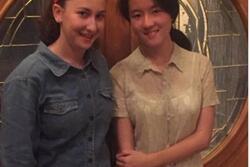Picking Battles
Not to be dramatic, but my blood boils whenever I see someone in Trump paraphernalia. Luckily, this is rarely an issue for me. My area of New York is notoriously liberal (Hillary Clinton lives 15 minutes from my house!), and I rarely encounter anyone diametrically opposed to me. However, I’m reminded on occasion that my town isn’t always the liberal bubble I make it out to be.
On one such occasion, I was sitting and eating lunch at school when my friend grabbed my arm. I looked up, confused, and asked her what was going on. She motioned across the room to another student who had just walked in. My eyes immediately went to the “Make America Great Again” hat perched on top of her head.
My initial reaction was to gawk at her, incredulous. I wasn’t sure what to do with myself. Directly following the election was really the only time when there had been blatant Trump support at my school, and almost all of those supporters had since retracted their support (at least publicly) in light of his tumultuous first year in office.
Once I got over my initial shock, I scanned the circle of seven girls who were sitting with me. For the most part, I was met with faces similar to my own: expressions of abhorrence and mild horror. But as I made eye contact with my friend sitting across from me, I immediately understood that the look in her eyes was not disgust, but anxiety. Though not as “out” about it as the girl wearing the hat, she’s a Trump supporter too, and it was obvious that a conversation on this topic would likely be uncomfortable for her. That didn’t exactly stop the rest of us, though.
We discussed how uncomfortable it was to have to see people we thought we knew act in such a way, especially since we have been going to school together since kindergarten. One friend said she was now planning on spending her free period in the library so she didn’t have to sit through an entire 40 minutes with the words “Make America Great Again” mocking her.
As I anticipated, my friend who’s a Trump supporter stayed silent for most of the conversation. Eventually though, she did speak up, saying: “I mean, Trump’s not that bad. I just think it’s silly to think you can’t be friends with someone just because they support him.”
Every single head whipped around. Six pairs of eyes stared into hers, and she sunk into her chair, trying to disappear. She knew she had opened a whole new can of worms. For the rest of the period we debated: should politics affect our friendships? This question was one I had always thought I knew the answer to, but I began to question it. This girl had been a close friend of mine for more than a decade, and had always been kind to me. I’ve always considered her to be a good person overall. But I had also always considered political alignment to be a defining characteristic and a good way to gauge morals.
It’s so easy to think you’ve explored every corner of your ideology when the opposition you encounter exists solely online, or with people you don’t know well. However, when those opposing viewpoints confront you personally, it makes things all the more complicated. This is why political discourse, especially with people you know and care about, is so integral to the progression of society–it introduces gray areas into spaces that can otherwise seem so black and white.
I am still friends with this girl. This conversation is a distant memory for most of my friends–there’s no more tension at my lunch table. The question of how politics defines friendships is a complex one, and I’m not sure there’s a clear answer. I think it is a gray area, one that is entirely contingent on context. One of the most important things I take away from this conversation is something I think we can all take to heart: pick your battles. No one is ever going to convince the die-hard Trump supporter to revoke their endorsement, just like no one is ever going to convince me to not be a feminist, or to not love Judaism. It is the undecideds, the apologists, and the moderates on whom we should focus, and with whom civil discourse will create real change.
This piece was written as part of JWA’s Rising Voices Fellowship.







